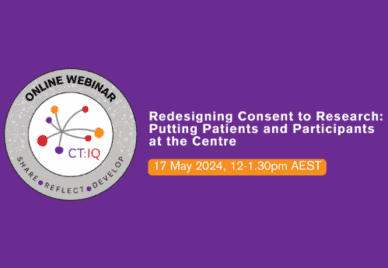
Redesigning Consent to Research: Putting Patients and Participants at the Centre
Go to partner eventabout Redesigning Consent to Research: Putting Patients and Participants at the Centre
The Australian Research Data Commons (ARDC) works in many ways, from transforming research innovation to functioning as an opportunity for others who are looking to commercialise out of academia. This is what makes us unique.
A few years ago the ARDC (through one of its predecessors, the Australian National Data Service) funded a project to establish a High Value Data Collection (HVDC) based on the Macquarie University Hospital data. The purpose of the project was to make patient data more easily accessible to researchers at the hospital and at the Macquarie University and discoverable by others. The project was not only successful in its own right but continues to thrive via a spin out company called Evidentli Pty Ltd.
Evidentli is a software company that empowers doctors, nurses, researchers and healthcare managers to quickly and accurately mine knowledge from real-world patient data. Artificial intelligence (AI) is used to automatically clean, federate and standardise data and is up to 100 times faster than traditional approaches.
So how did Evidentli make the jump from an academic project to a marketable product?
“Much of the motivation to launch Evidentli is the vision we were able to demonstrate during this early project,” Dr Guy Tsafnat, lead researcher on the HVDC project and Founder of Evidentli said.
One use of the data collection was to conduct an internal clinical quality improvement project which led to reduced complications and shorter stays for some patients, as well as reduction in costs for the hospital. From this, Dr Tsafnat and his team demonstrated a similar idea as part of the 2018 “Sandbox for Innovation” challenge from NSW eHealth and won, beating 150 other applicants.
From winning, the newly established Evidentli was quickly implemented commercially, gaining global traction. Since then, they have been working with public and private hospitals as well as life sciences companies in Australia, Asia, Europe and the USA to create and connect local data collections primarily for clinical quality improvement and research.
In the wake of COVID-19, they are collaborating with Amazon Web Services, Oracle and others on COVID-19 specific projects.
“We are working with the Australian Alliance for AI in Healthcare and Oracle on a national Australian preparedness system against pandemics and disasters to meet the innovation challenge posed by the Australian Digital Health Agency. So as you can see the impact of the HVDC grant has been significant,” Dr Tsafnat said.
Dr Tsafnat credits the structure provided by the ARDC as helpful in shaping the vision. Their standardisations around handling data, ethics, data governance, FAIR (finadable, accessible, interoperable and reusable) and more, impacts Evidentli’s product strongly. By having this in place, this ensures they meet all standards before releasing it to customers, saving them going back and forth.
Looking ahead, Evidentli hopes to share its capability worldwide, starting with hospitals and increasing their capacity to improve and be more agile.
“Having agile hospitals means we can learn from every patient’s experience. In a ‘smart hospital’ that rapidly learns and adapts to improve care when something is lacking, the hospital can detect the problem, solve it and immediately measure the improvement in patient health. This saves countless lives and with growth will save even more,” Dr Tsafnat said.
Find out more about Evidentli and the ARDC data management practices.